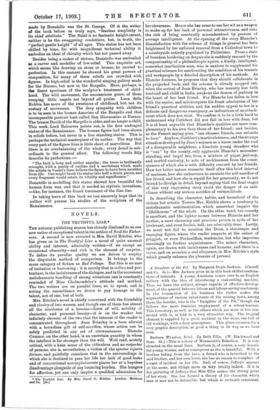NOVELS.
THE TRUTHFUL LIAR.*
THE autumn publishing season has already disclosed to us one new writer of exceptional talent in the author of Said the Fisher- man. A second is now revealed in Mrs. David Ritchie, who has given us in The Truthful Liar a novel of quite unusual ability and interest, admirably written—if we except an occasional obscurity—and rich in the element of surprise. To define its peculiar quality we are driven to employ the disputable method of comparison. It belongs to the same category of fiction as Red Pottage. But this is no case of imitation or borrowing : it is merely that in maim and por- traiture, in the incisiveness of the dialogue, and in the occasional melodramatic handling of strong situations one is constantly reminded of Miss Cholmondeley's attitude and method. The two writers are on parallel lines, so to speak, and in noting the resemblance we desire to pay homage to the talent, not of one, but of both.
Mrs. Ritchie's novel is chiefly concerned with the friendship and rivalry of two women, and though one of them has almost all the attributes of a heroine—force of will, nobility of character, and personal beauty—it is on the weaker but infinitely cleverer of the two that the interest of the reader is concentrated throughout. Jean Briarley is a born altruist with a boundless gift of self-sacrifice, whose action can be safely predicted in any set of circumstances. Blanche Cumnor, on the other hand, is an uncertain quantity in whom the intellect is far stronger than the will. Well read, acutely critical, with a keen sense of the ridiculous and no respecter of persons, she is, nevertheless, a victim of the spretae injuria formae, and painfully conscious that in the surroundings in which she is destined to pass her life her lack of good looks and of conventional accomplishments places her at a hopeless disadvantage alongside of any bouncing hoyden. She hungers for affection, yet can only inspire a qualified admiration for and • Come. Truthful Liar. By Mrs.David G. Ritchie. London : Methuen Da)
her cleverness. Hence she has come to use her wit as a weapon to make up for her lack of personal attractiveness, and runs the risk of being constantly misunderstood by persons of average intelligence. At the opening of the story Blanche's dissatisfaction with the scheme of things in general has been heightened by her enforced removal from a Cathedral town to a countryside entirely populated by Philistines. From a state of boredom bordering on despair she is suddenly rescued by the companionship of a philanthropic squire, a kindly, intelligent, somewhat inarticulate man, who is anxious to supplement his practical schemes for ameliorating the condition of his tenants and workpeople by a detailed description of his methods. As Blanche foresees, he proposes that they should collaborate in the projected book, and the scheme is already mapped out, when the arrival of Jean Briarley, who has recently lost both husband and child in India, awakens the demon of jealousy in the heart of her best friend. For Blanche has fallen in love with the squire, and misinterprets his frank admiration of her friend's practical abilities, and his sudden appeal to her in a delicate and dangerous emergency, as indications of an attach- ment which does not exist. We confess it to be a little hard to understand why Cuthbert did not fall in love with Jean, but it is at least arguable that Blanche's qualities are more com- plementary to his own than those of her friend ; and besides, as the French saying goes, " one chooses friends, one submits to love." Anyhow, Cuthbert's inarticulateness, and the strange situation developed by Jean's sojourn as a nurse under the roof of a. disreputable neighbour, a dissolute young decadent who is " cut " by the county, only aggravate Blanche's misunder- standing, and impel her, from a mixture of pique, jealousy, and morbid curiosity, to acts of recklessness from the conse- quences of which she is with difficulty rescued by her friends. How her better nature reasserts itself after this brief interval of madness, how she endeavours to emulate the self-sacrifice of her friend, and how she is repaid for her generosity, we do not intend to divulge in detail, beyond saying that the final stages of this very engrossing story avoid the danger of an anti- climax without any serious sacrifice of verisimilitude.
In describing the character, habits, and household of the vicious but artistic Towers Mrs. Ritchie shows a tendency to melodramatic sentimentalism which somewhat impairs the " lifelikeness " of the whole. On the other hand, her comedy is excellent, and the lighter scenes between Blanche and her mother, a most charming and gracious person in spite of her irrelevant, and even foolish, talk, are admirably done. Lastly, we must not fail to mention the Dean, a statuesque and engaging figure, whom the reader suspects at the outset of priggish, or even Pecksniffian, tendencies, but who improves amazingly on further acquaintance. The minor characters, again, are drawn with incisiveness and humour, and there is a verve, and on occasion a real eloquence, in Mrs. Ritchie's style which greatly enhance the pleasure of perusal.














































 Previous page
Previous page